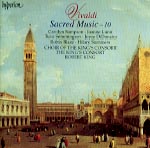The only reason to offer yet another recording of Vivaldi’s well-worn if obsessively adored Gloria is if you’re including it of necessity in a collection of this composer’s complete sacred music–which is exactly what Robert King and his King’s Consort have done. In this, the final volume in Hyperion’s excellent series, we hear a fine if not transcendent Gloria–the notes are well in place, the solo singing is first rate, and the energy is notably charged, but the sound is strangely scruffy–along with some less-familiar pieces, including a newly discovered, dare I say masterpiece(?), the Nisi Dominus RV 803 (not to be confused with the very well known Nisi Dominus RV 608, wonderfully recorded by Andreas Scholl on Decca). We also get to hear–as the final work on this closing volume–“the first modern outing” of Giovanni Ruggieri’s own Gloria (written in 1708, seven or so years before Vivaldi’s composition), a piece that influenced Vivaldi in more than one instance and that certainly stands worthy of attention even apart from this notable association.
In the previous volume in this series, I was most enthusiastic about the performance of the exciting mezzo-soprano Joyce DiDonato, and she makes an appearance here–unfortunately all-too-briefly (if still memorably) in two movements of the Gloria. But the real reason to savor this disc is for the above-mentioned Nisi Dominus, formerly attributed to Galuppi but conclusively shown–just in time for inclusion here–to be a “missing” Psalm-setting from Vivaldi’s output in 1739. Written for three solo voices and five obbligato instruments–including viola d’amore, chalumeau, and a “violino in tromba marina” (a type of modified violin)–this substantial work offers some of Vivaldi’s more adventurous and inventive turns for soloists while delving into some interesting timbral territory.
In addition to DiDonato in the Gloria, vocal standouts are mezzo Tuva Semmingsen and contralto Hilary Summers in the Nisi Dominus, who leave us wishing for more–and undoubtedly there will be, perhaps in Bach, Handel, Mozart, or anything else these wonderful singers choose to do. Incidentally, the sound in the Nisi Dominus (recorded at a different time and place) is clearer and more evenly balanced than in the Gloria.
































